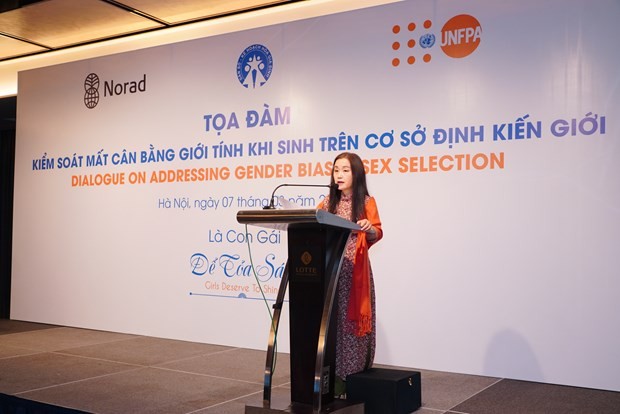
Joint efforts made to address gender-biased sex selection as girls deserve to shine
Latest
 |
| United Nations Population Fund (UNFPA) Representative in Viet Nam Naomi Kitahara speaks at the dialogue. (Photo: UNFPA) |
Talking to the press on the sidelines of the dialogue on addressing GBSS, held both online and offline, Kitahara pointed out the main factors that are driving GBSS in Viet Nam, including the notion of some preferences.
Vietnamese people still prefer to have boys to girls, she continued, noting that the preference has to be stopped because this is the continuation of socio-cultural practice which is not promoting the value of girls.
“Another factor is the availability of technology in Viet nam", she added. “Although the disclosure of the sex of a child is prohibited in Viet Nam, people are still able to find out through informal channels”.
The fertility limitation can also drive GBSS, according to the UNFPA Representative.
“It is very important that individuals and couples are able to decide freely and responsibly the number, spacing and timing of having children,” she suggested, stressing that it is in line with principles of the International Conference on Population and Development to which Viet Nam is a signatory.
The dialogue on GBSS was jointly held by the General Office for Population and Family Planning under the Ministry of Health, the UNFPA and the Embassy of Norway. It forms part of the project “Addressing gender-biased sex selection and related harmful practices in Asia” funded by the Norwegian Agency for Development (NORAD) from 2020-2022.
In her remarks, Ambassador of Norway Grete Lochen said harmful practices take different forms in different countries, which have impacted the health of girls and women, robbed them of educational opportunities, and made it hard for them to take part in society and working life.
“In Viet Nam, we are very pleased to work together with UNFPA in addressing gender-biased sex selection and some preferences", she said.
Sharing Norway’s strategy to eliminate harmful practices, the ambassador emphasised strengthening data collection and monitoring by establishing systems that will record vital statistics such as births and deaths by gender.
Apart from the reform of laws such as family laws, it is crucial to boost advocacy efforts and raise public awareness, she said, highlighting the media as an effective actor in this regard.
“Girls deserve to shine”, she stressed, while expressing her wishes on the occasion of International Women’s Day (March 8).
According to the 2019 national population and housing census, the sex ratio at birth was 111.5 boys per 100 girls, as compared with the normal level of 103-106 boys per 100 girls.
Viet Nam will have 1.5 million more men than women aged 15-49 by 2034, and the number would reach 2.5 million if the sex ratio at birth imbalance remains unaddressed.
In an interview granted to the press, Nguyen Van Anh, Founder and Director of the Centre for Research and Application of Sciences in Gender-Family-Women and Adolescents (CSAGA), said both girls and boys should have opportunities to develop happily.
“Women can also gain success if they face no discrimination", she added. “Men and women should be respected equally”.
Kitahara said, “Viet Nam is very aware of the problem of GBSS and has implemented many measures”, expressing her belief that with joint efforts, the above-said harmful practices can be reversed.

















